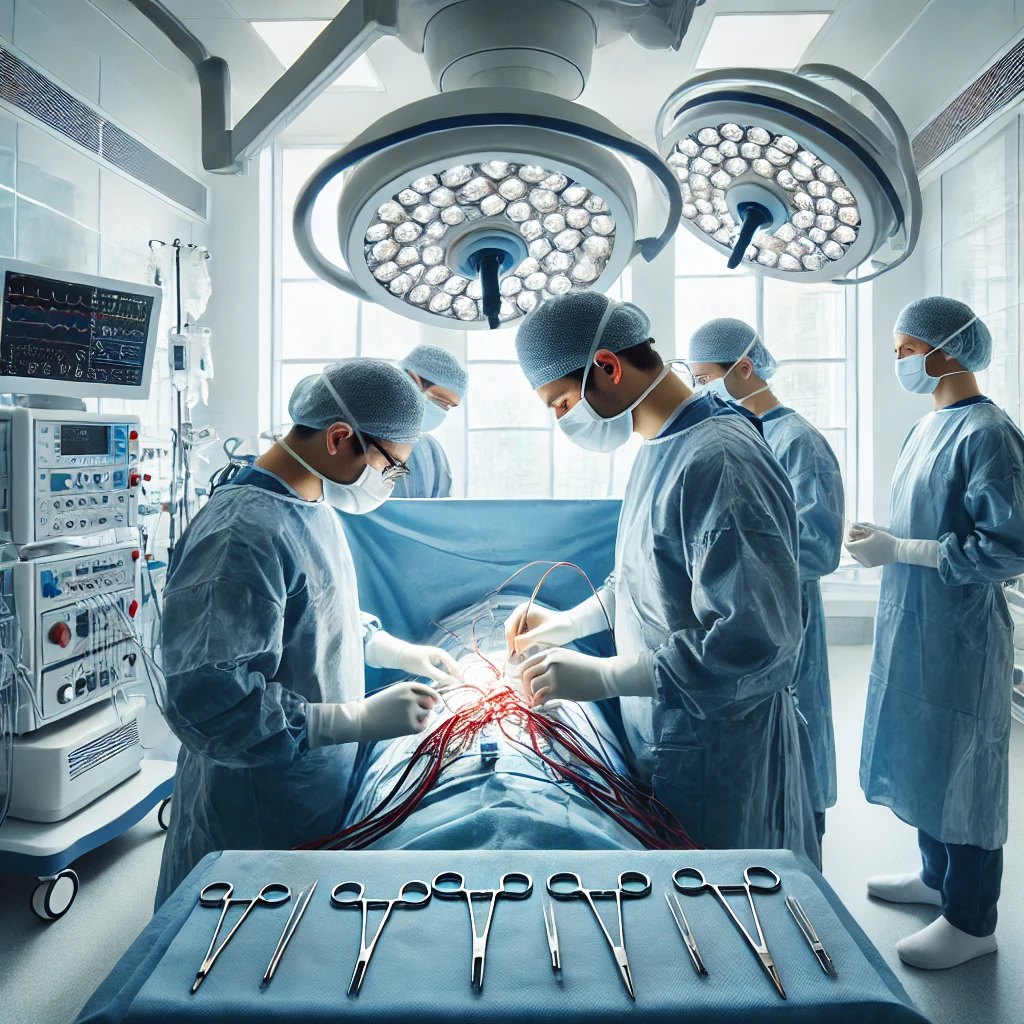Radical nephrectomy is a surgical procedure to remove a diseased or cancerous kidney. KK Virat Hospital, Karimnagar, offers advanced kidney surgery services with expert urologists, state-of-the-art operation theatres, and comprehensive post-surgical care.
What is Radical Nephrectomy?
Radical nephrectomy involves the complete removal of the kidney, including surrounding tissues and sometimes nearby lymph nodes, to prevent the spread of disease.

When is Radical Nephrectomy Needed?
Medical Conditions Requiring Radical Nephrectomy
- Uncontrolled Kidney Infections: Severe infections that do not respond to medication.
- Kidney Cancer (Renal Cell Carcinoma): A malignant tumour affecting kidney function.
- Severe Kidney Damage: Trauma or non-functional kidneys due to chronic conditions.
- Large Kidney Tumors: Benign or cancerous tumours that may cause pain or obstruction.
- Polycystic Kidney Disease (PKD): When kidney cysts severely impair function.
Diagnosis and Pre-Surgical Evaluation
Diagnostic Tests
- CT Scan / MRI: Determines tumour size and location.
- Ultrasound Imaging: Evaluates kidney function.
- Blood and Urine Tests: Check kidney function and overall health.
- Biopsy (if needed): Determines whether a kidney tumour is cancerous.
Pre-Surgery Care & Medical Preparation
- Comprehensive Health Checkup: Ensuring the patient is fit for surgery.
- Blood Pressure and Diabetes Control: Managing conditions that may affect surgery.
- Fasting Guidelines: Instructions on food and water intake before surgery.
- Medication Adjustments: Guidance on stopping or continuing medications.
Mental and Physical Preparation
- Breathing Exercises: To aid in post-surgery recovery.
- Patient Counseling: Educating patients on what to expect.
- Hydration and Nutrition: Proper diet before surgery.
Types of Radical Nephrectomy
- Open Radical Nephrectomy: Traditional surgery with a large incision.
- Laparoscopic Radical Nephrectomy: Minimally invasive with small incisions.
- Robot-Assisted Radical Nephrectomy: Advanced robotic surgery for precision and faster recovery.
The Radical Nephrectomy Procedure
- Pre-Surgical Preparation: Blood tests, imaging, and anaesthesia administration.
- Incision and Kidney Removal: Depending on the type of surgery, the kidney is carefully detached and removed.
- Closure and Recovery: The surgical site is closed, and the patient is monitored in the recovery unit.
Post-Surgical Care and Recovery
Immediate Post-Surgical Care
- Pain Management: Medications to control discomfort.
- Monitoring for Complications: Checking for infections or bleeding.
- Fluid and Diet Management: Gradual reintroduction of food and water.
Long-Term Recovery
- Wound Care: Proper dressing and hygiene to prevent infections.
- Diet and Hydration: Maintaining kidney function with a healthy diet.
- Regular Follow-Ups: Monitoring kidney health through routine checkups.
- Activity and Exercise: Gradual return to normal activities.
Radical Nephrectomy vs. Partial Nephrectomy
Radical Nephrectomy
- Removes the entire kidney and surrounding tissues.
- Recommended for larger tumours or severe kidney damage.
- Ensures complete removal of cancerous cells.
Partial Nephrectomy
- Preserves kidney function.
- Removes only the affected part of the kidney.
- Suitable for smaller tumours and localized kidney diseases.
Risks and Complications
- Bleeding: Controlled through advanced surgical techniques.
- Infections: Prevented with strict hygiene protocols.
- Reduced Kidney Function: Managed with lifestyle modifications and follow-up care.
Why Choose KK Virat Hospital for Radical Nephrectomy?
Expert Urology Team
- Highly Skilled Urologists and Surgeons: Specialists in kidney surgeries.
- Advanced Surgical Technology: Laparoscopic and robotic-assisted techniques.
- 24/7 Post-Surgical Monitoring: Ensuring patient safety and recovery.
State-of-the-Art Facilities
- Personalized Patient Care: Tailored treatment plans.
- Modern Operation Theaters: Equipped with the latest surgical tools.
- Comprehensive Pre & Post-Operative Care: From diagnosis to recovery.
Your Health, Our Priority – Book Your Consultation Today!
Radical nephrectomy is a life-saving procedure for kidney cancer and severe kidney conditions. At KK Virat Hospital, Karimnagar, we offer expert surgical care, advanced technology, and comprehensive post-operative support to ensure the best outcomes for our patients.
- Call Us Directly: Get in touch with our medical coordinators to schedule an appointment with an expert urologist.
- Direct Visit: You can visit our hospital directly by carrying your previous medical records if you have a medical history. However, admission will be based on the doctor’s recommendation.
What is the success rate of radical nephrectomy?
Radical nephrectomy has a high success rate, especially when performed by experienced surgeons. The survival rate depends on the underlying condition, with kidney cancer patients benefiting from early detection and treatment.
How long does the surgery take?
The procedure typically lasts between 2 to 4 hours, depending on the complexity and surgical method used.
Will I need dialysis after radical nephrectomy?
If the remaining kidney is healthy and functioning, dialysis is not required. However, patients with pre-existing kidney conditions may need additional monitoring.
Is radical nephrectomy a painful procedure?
Pain is managed with anaesthesia during surgery and pain relief medications after the procedure.
How long is the recovery period?
Patients typically recover within 4 to 6 weeks. Laparoscopic and robotic-assisted surgeries may lead to a faster recovery.
What are the dietary restrictions after surgery?
A kidney-friendly diet with reduced salt and protein intake is recommended to prevent strain on the remaining kidney.
Are there any lifestyle changes needed after the surgery?
Yes, patients should maintain a healthy lifestyle, including proper hydration, avoiding smoking and alcohol, and following prescribed medications.
What are the risks of radical nephrectomy?
The risks include infection, bleeding, blood clots, and reduced kidney function, but these are minimized with expert surgical techniques.
How soon can I return to work after surgery?
Patients with sedentary jobs may return in 2-4 weeks, while those with physically demanding jobs may need 6-8 weeks of recovery time.
Can I live a normal life with one kidney?
Yes, many people live healthy lives with a single kidney. Regular follow-ups and a balanced lifestyle help maintain kidney function.


